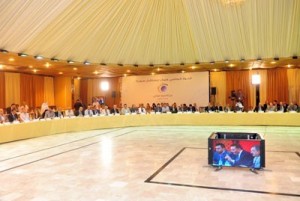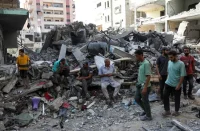Unlike other Arab leaders confronted to a protest movement such as former Egyptian President Hosni Mubarak or Libyan leader Muammar Gaddafi, Syrian President Bashar al-Assad launched a wide political reform program coupled with a reasonable timetable extending until the end of 2011 at the most. This change which was initiated by Mr. Al-Assad extended beyond the demands of the vast majority of the people and aims at leading Syria out of an archaic and controversial system which prevailed throughout fifty years towards a modern and democratic state. These reforms include – among others – the revision of the constitution and namely article 8 which monopolizes power in the hands of the Baath party, the adoption of a law on partisan plurality, the drafting of a new media law and a new modern electoral law, and the elaboration of a new law related to the local councils.

In order to guarantee the success of these reforms and ensure that they reflect the real aspirations of the majority of the Syrian people, Bashar Al-Assad came up with a mechanism based on dialogue and discussion. He could have promulgated these laws through presidential decrees as his prerogatives allow him to do so. However, he decided to ensure the participation of the political, intellectual, cultural and economic elite as well as the loyalists, oppositionists and the independent figures so that the change is not imposed from above and is the fruit of wide popular consensus.
In parallel to this process some oppositionist powers, namely the radical Islamic movement which includes certain wings from the Muslim Brotherhood and Takfiri, Salafi and Wahhabi groups are fueling sectarian dissent and hatred through a speech from the Middle Ages conveyed by media outlets with obscure sources of financing.
Throughout weeks, the Western media outlets completely disregarded the emergence of armed groups, although 400 military men were killed and 1,300 wounded since the beginning of the incidents on March 15. After AFP published photos of armed insurgents near the Syrian-Turkish border and UPI carried reports about the attacks against the security forces, the public opinion started to realize that the images it was receiving of the events in Syria were biased and partial. This violent opposition is leading a fierce political and media campaign against the Syrian regime in Western capitals and is pleading for a military intervention by NATO in Syria. This was the main goal of the Syrian oppositionists who convened in Saint Germain in Paris, while irresponsibly ignoring the fact that any war against Syria could extend beyond the border and ignite a wide-scale fire throughout the Middle East. Moreover, the dismantlement of the Syrian state –similar to what was seen in Iraq following the American invasion- will allow groups affiliated with Al-Qaeda to gain a new “land of jihad” on Europe’s border. Islamic terrorism will have a chance to regenerate itself by presenting any war launched by NATO as being a modern time Crusade against the Land of Islam.
News analysis: Syria in the face of foreign interference
During this past week, the Syrian events witnessed many important developments that will cast their shadows on the situation, at a time when the national centralized state is showing determination to launch the move towards a new stage through the launching of national dialogue which was called for by President Bashar al-Assad to discuss a package of constitutional and legal changes that would set the foundations for a pluralistic regime and meet the aspirations of the Syrian people.
Firstly: Foreign interference in Syria bluntly escalated through the presence of the American and French ambassadors in the city of Hama during the demonstrations that were staged on Friday, after it has become known that the Western embassies are establishing direct ties with the opposition and its symbols on the domestic arena and playing a role in politically directing their programs. This provocative step raised wide popular anger in Syria and confirmed the Western attempts to prevent the launching of dialogue and ensure the continuation of the crisis by providing a political umbrella to the opposition groups which enjoy relations with the Western governments and the Zionist lobby.
Secondly: The direct goal behind the Western action on the ground aimed at securing a patch of influence inside the country, in order to set the foundation for interference after the Syrian state thwarted the attempt to control –by use of arms- a border region that could have provided the desired bridge for military interference under the headline of relief and humanitarian aid.
Thirdly: The Syrian opposition on the domestic arena was blackmailed by the groups linked to the West and Israel, and which participated in the Saint Germain and Antalya meetings. They are rejecting dialogue under the slogan of seeing the halting of the security solution in advance, without offering a realistic solution to the existing security problem. Indeed, they are still denying the presence of an armed wing of takfiris and Muslim Brotherhood elements who are active on the ground and are exploiting the protests.
The oppositionists who are celebrating Western support will eventually discover that the United States is using them as a bargaining card on the table of negotiations, around which it is trying to sit with President Bashar al-Assad. In the meantime, Syria’s leader has settled his choice with his people through the launching of the renewal process that will affect the state and its institutions and the defiance of the pressures and the foreign interferences.
The backdrop of the renewed conflict in Egypt
The stormy developments witnessed in Egypt point to the fact that the course of crumbling changes and renewed political conflicts will govern the Egyptian reality for a long time before the new political authority and its institutions settle down.
Firstly: The events seen during the last two weeks reveal the presence of a wide and active popular base accompanying the revolution youth and the political organizations seeking the hastening of change and the deterrence of the United States’ attempts to establish a ceiling for the Egyptian regime, including the military council and the Muslim Brotherhood organization. This would renew Western colonial hegemony and ensure the continuation of the Egyptian security and political commitments, thus respecting Israel’s interests and preventing the recanting of the Camp David accords. This political clash that has generated a massive popular action which imposed itself on the Muslim Brotherhood’s command and the military council was staged under the headline of holding the symbols of the former regime accountable, after the revolution youth exposed a deal set up by the Americans to revive the group that constituted the nucleus of the authority during the days of President Hosni Mubarak. In the meantime, information revealed that Brigadier General Omar Suleiman is still playing a pivotal role in drawing up the inclinations of the military council and controlling the authority, especially at the level of the Egyptian security institution.
Secondly: Information is circulating in the Egyptian political circles about a direct American and Israeli support to Amr Moussa’s presidential campaign, which is also backed up by Saudi Arabia.
Thirdly: The United States is using two cards to subdue the Egyptian state, i.e. the economic situation and sectarian strife.
Egypt is still in labor and facing the threat of a coup against the slogans of the popular revolution. It is clear that while the majority of the people, the revolution youth and the national political forces are standing in one camp, the Muslim Brotherhood, the army generals and the remnants of Mubarak’s regime are standing in another. The equation that will prevail as a result of the conflict between these two camps will determine Egypt’s future.
Pierre Khalaf is a Senior Researcher at the Arab and International Center of Strategic Studies, Beirut.
Source: Voltaire Network














Pingback: Get Political Fund » Blog Archive » The West and Syria | Oriental Review